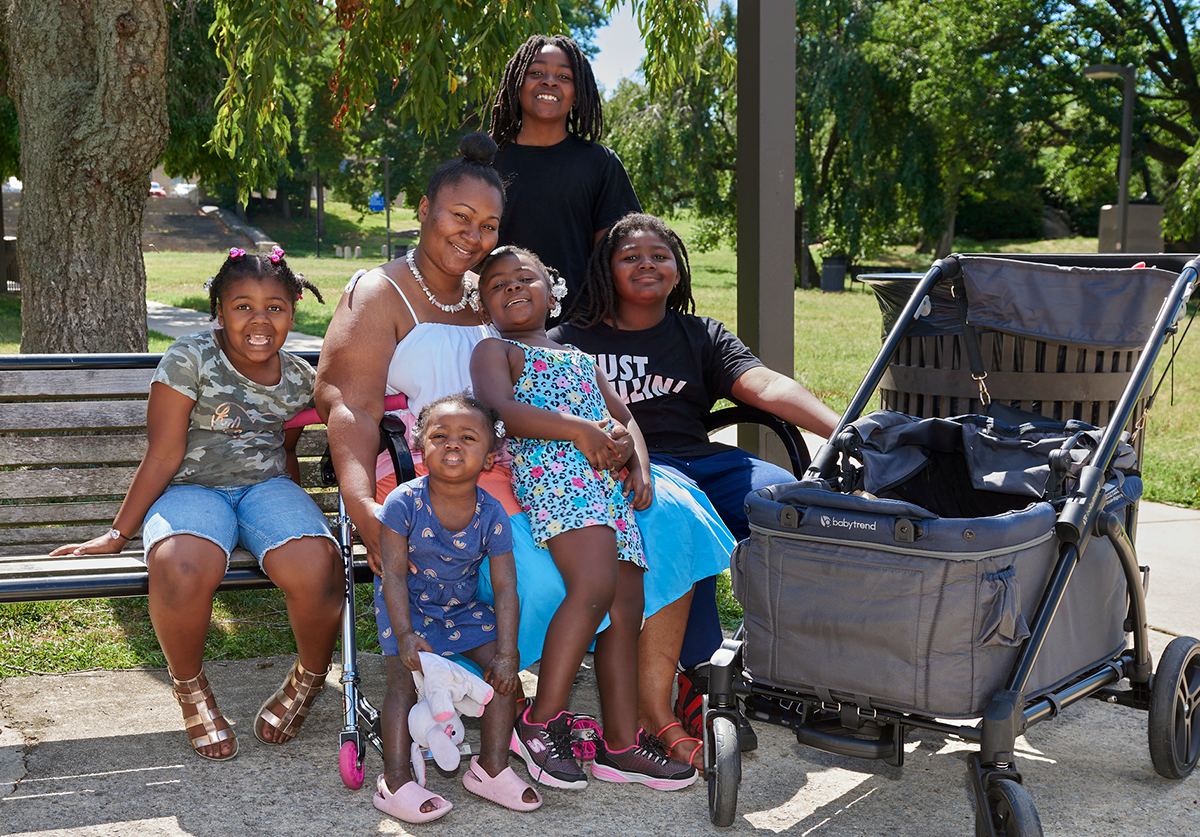

Whitney Robinson has been ruminating on the idea of designing a better maternal health experience for more than a decade, ever since the terrible day in 2011 when she lost her first baby at 22 weeks of pregnancy. The loss of control that Robinson felt during that experience, exacerbated by a medical team that didn’t listen to her needs, has never left her, even more than a decade later now, as a mother of four children ages 2 through 8.

In 2018, Robinson created The Renée, a startup business that aims to use the problem-solving strategies of the tech world to bring rapid and intentional change to maternal health.
The first step was a series of what Robinson called “jam sessions,” casual gatherings in cities around the country in which Black women shared their pregnancy and postpartum experiences. Robinson would use that feedback, and her experience with the strategy known as design thinking, to develop a digital product that could empower women to take back some control.
“How would our [maternal health] experiences look if Black women were to design them?” says Robinson. “Can we build that?”
The issue of maternal health is a pressing one — especially for Black women like Robinson. Black women in the United States are nearly three times more likely than white women to die from a pregnancy-related cause. A Philadelphia report on severe maternal morbidities found that serious health problems caused by pregnancy or childbirth were more than twice as likely to strike the city’s Black population.

After meeting Whitney Robinson through a Facebook group, Jean Sanderlin agreed to participate in a “jam session,” in Philadelphia, one in a series of casual gatherings around the country in which Black women shared their pregnancy and postpartum experiences. As a mother of five children, Sanderlin was an expert. Many of the mothers who attended the sessions were entrepreneurs and business owners themselves, including Malissa Green (not pictured), who runs Playish, an event childcare business that offers mental health breaks for families with children.
The racial disparity in maternal health is a problem that Medha Sharma, now a third-year student at the Perelman School of Medicine, learned about in a health systems class. Sharma wanted to help, so she invited Robinson and The Renée to be part of a new “social determinants of health accelerator” program that she and fellow student Michael Karamardian were piloting within Penn HealthX, the school’s medical student entrepreneurship group.
Conceived in 2021 by Sharma and Karamardian along with then-Penn HealthX co-presidents Alex Beschloss and Elana Meer, the accelerator is the business-minded medical students’ answer to the social determinants of health disparities highlighted by the COVID-19 pandemic.
“We thought of a way to team med students up with companies that are solving problems related to social determinants of health,” Beschloss says, “so they could work together to solve those problems and give med students the opportunity to engage in the business world.”
Sharma and Karamardian were ready to jump in and build the initiative from the ground up; both had experience working as consultants before medical school, and they were already familiar with the space, as the pair were working as part of the Penn Medicine-Wharton Fund for Health team, helping to direct $5 million in investments from Penn Medicine and the Wharton Social Impact Initiative into Philadelphia startups focused on improving the social determinants of health for economically disadvantaged Philadelphians.
The Penn HealthX approach was to invest in this new SDOH initiative through the direct hands-on efforts of its student members. In its first iteration last year, the accelerator paired three small startups geared toward solving public health problems — The Renée, along with two companies focused on food insecurity — with six medical student interns who could lend support free to the company during the early days when businesses are most likely to fail. The Renée’s two medical student interns, then-first-years Danielle Brown and Emily Xu, mostly helped Robinson find new funding opportunities — perhaps the biggest challenge facing an early-stage business.
The internship, for which students receive a stipend from Penn HealthX, gave Xu a deeper understanding of the problem of maternal health disparities. “Before it was kind of easy to just say, ‘It’s the large institutions. It’s their issue.’… But it’s a bit more complex than that,” says Xu, whose experience helping to launch a health care startup in college made her an ideal candidate for the accelerator. “I’ve learned a lot about… the creativity involved in trying to innovate on top of what’s already been done. My experience has shown me what businesses and startups can do to tackle these issues.”

Brown, The Renée’s other intern, and Angela Malinovitch, both now second-year students, took over leadership of the accelerator when Sharma and Karamardian began their clinical rotations in early 2022. After getting feedback from last year’s startup and student participants, Brown and Malinovitch formalized the accelerator’s participation process. Now, interested startups apply to the program on a rolling basis by submitting a high-level work plan that outlines how a four-month student intern can help and their proposed deliverables.
The ideal startup participant is led by a team with a business or technology background and is passionate about a health care issue, but lacks the training of a medical professional, Brown says. “They don’t have the funding to hire an MD to do the broader chief medical officer role,” she says. “It’s really beneficial to the companies to have [a student intern] who has an inside view on academic research and health care. [The intern] can not only provide that new perspective, but also help create marketing materials that resonate with providers or think about how to incorporate [the startup’s product] into an insurance scheme. That’s why we’re focusing on the smaller stage. It really does fill a critical need.”
Also in the accelerator’s pipeline: bi-annual presentations by student interns about their experience, providing an opportunity to both learn from peers and foster community among participants.
As for The Renée, the startup launched its first digital product, a web-based tool that helps pregnant women build their support network, in beta in May. The app prompts users to consider how people already in their circle — friends, family, neighbors, providers, and others — can play specific roles in supporting them during the pregnancy and postpartum period. The culmination of Robinson’s 100-plus hours of jam sessions on maternal health with Black women, the app also includes a “parlée,” a biweekly virtual drop-in for participants.
“I want it to feel non-clinical, non-medical, but you come and you sit and you listen and talk, chat, laugh, cry, braid your hair. And you’re learning,” Robinson says. “People learn by doing and sharing and stories. The greatest impact of this application is to show that building support may not be as hard as we think. Maybe it’s closer than we think.”








